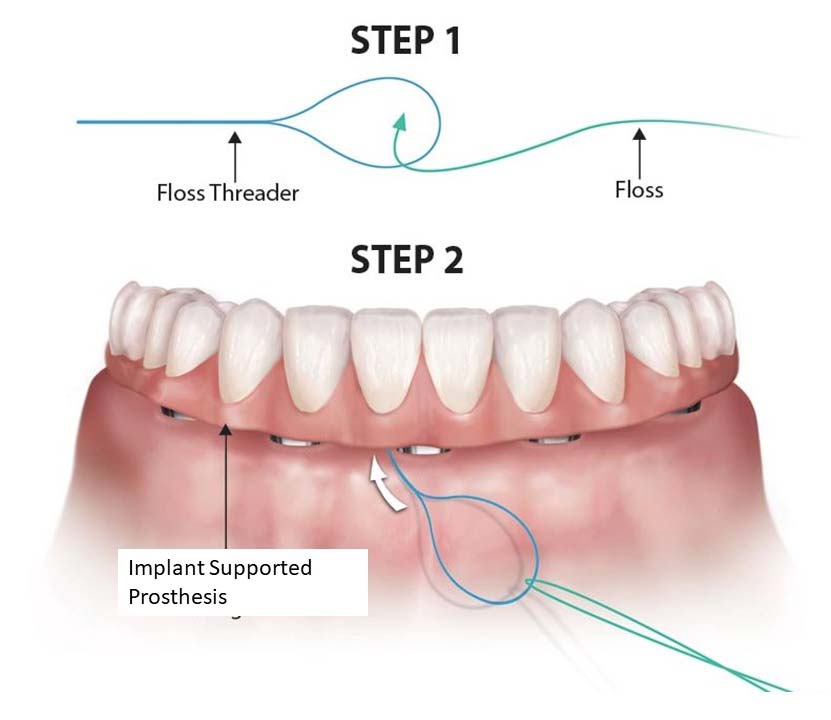If your implant was used to restore a single missing tooth, the easiest thing to do is to treat it just like a regular tooth. You have to brush and floss around it and ensure that you don’t get food packed around the sides of the implant.
Sometimes, because the width of the implant is narrower than the root that it replaces, it makes it easier for food to get trapped between your new crown and the adjacent teeth. Food that accumulates in those places can lead to gum disease which can affect the implant, or it can lead to decay on the natural teeth around it.
If your implants were used to restore a bridge, say, three or four missing teeth, you’ll care for it like you would a regular fixed bridge: brush and floss around the implants and use a floss threader, a proxa-brush, or a water pick to clean out debris from under the bridge.
If your implant was used to restore a full arch: for example, an All On 4 type treatment or implant bridge that spans your entire mouth, it’s even more important that you continue to maintain your oral health, because these implants are all that are keeping your teeth in now. The same procedures apply – brush and floss around the teeth and use interdental aids for under the bridge.
Implant overdentures are some of the easiest prosthetics to maintain. After every meal, remove the denture, give it a good rinse and rinse out your mouth so you don’t get food accumulated around your gums. To clean the denture, brush them twice a day like you would your natural teeth, being sure to brush the underside as well. In the mouth, you will usually see small gold abutments which help to hold the denture in place. Using a soft toothbrush, brush on and around the abutment and make small circular motions. This will help you get rid of the plaque around the abutments and keep them clean.
An important point to take note of is that the abutments as well as the components in the denture are subject to wear and tear. Over a period of time, you might find that your dentures get a little loose. When that happens, come and see us so we can replace the attachments so you can have a tight fit again.
One tip for extending the lifespan of your dentures is to seat them in place and use your fingers to snap them on securely onto the implants before you bite down. Conventional denture wearers tend to have a habit of placing the dentures in their mouth and just closing down on them to seat them. Doing so is convenient in the short term, but, over a long period of time, it will increase the wear and tear on the components and you probably will have to get them replaced more frequently.
In terms of implant maintenance, it is important to see a hygienist every six months or however often you are recommended to. They are able to clean around the implants and ensure that bacteria does not buildup around them. Remember, implants are anchored in natural bone which is susceptible to developing gum disease even if the implants themselves cannot get attacked by bacteria. If you lose bone around and the implants, you lose the support that the implants have. If this goes on unobstructed over a long period of time, the implant itself may fail.
Follow these steps to maintain your oral hygiene and see your hygienist regularly:
For Single Tooth Implants With Crowns
- Take care of them just as you would your own natural teeth
- Brush twice a day with a soft toothbrush, being sure and clean well (and gently) along the gum line
- Floss between the implant crown and the adjacent teeth
- Use an oral irrigator (Water-Pik) to help remove debris from getting trapped between teeth
- See your hygienist and dentist twice a year for a cleaning and to have the implant and crown checked
- Additionally, if you are someone who grinds or clenches your teeth, ask your dentist about having an occlusal guard (night guard) made for you to wear to protect it from stress
For Fixed Implant Bridges Or All-On-4 Prostheses
- Brush twice daily with a soft toothbrush, and be sure and clean well along the gum line

- Floss underneath the bridge with a floss threader to remove any plaque and debris, as well as between it and the adjacent teeth
- We recommend using an oral irrigator (Water-Pik) twice a day to help remove debris from getting trapped between teeth
- See your hygienist and dentist twice a year for a cleaning and to have the implants and bridges checked (more frequent, if they recommend it for you)
- Again, if you are a grinder or clincher, talk with your prosthodontist about having an occlusal guard (night guard) made to wear at night
For Removable Implant Dentures
- Take them out and rinse them after each meal and brush them gently with a denture brush and non-abrasive toothpaste or denture cleaner
- Brush around your implants with a soft toothbrush to remove any plaque and food debris
- Rinse your dentures well before placing them back in your mouth
- If your prosthodontist recommends removing them and soaking them overnight, follow the instructions on the type of cleaner you’re using
- Do NOT use abrasive cleaners or hard brushes – the microscopic scratches in the acrylic will only make them stain more and collect more plaque
- Check the attachments regularly, and if they become loose or stop gripping well, see your prosthodontist and have them replaced (this is normal from time to time)
- See your hygienist and dentist twice a year for a cleaning and to have the implants checked and attachments changed as is needed

